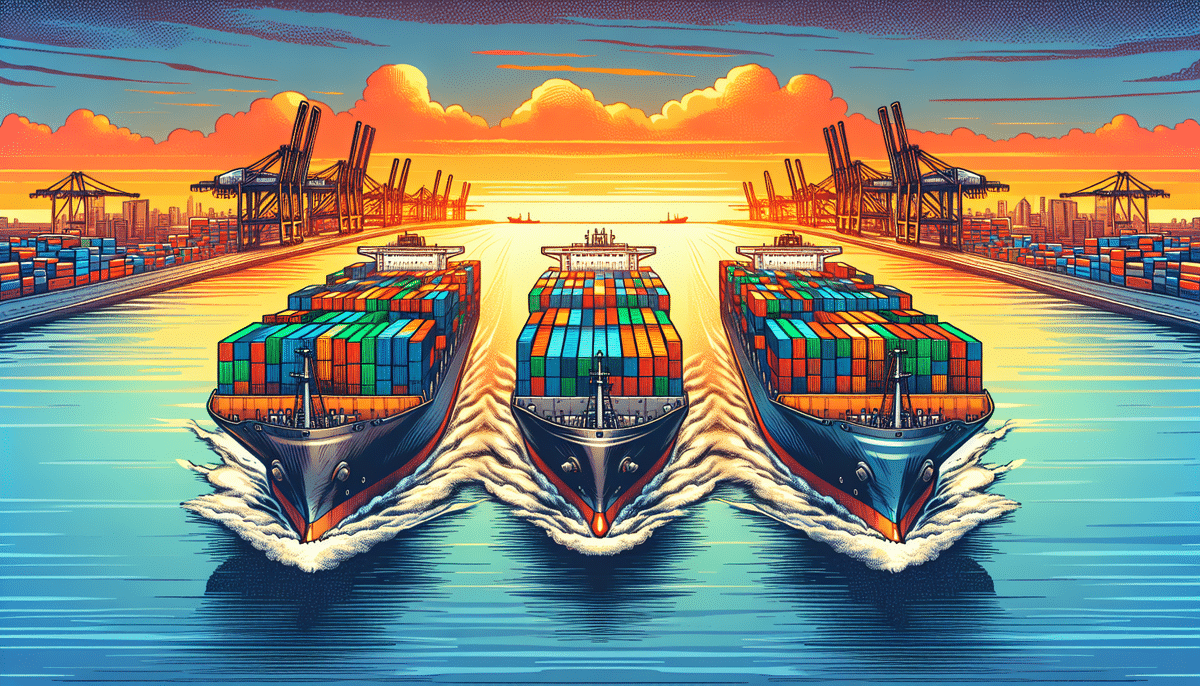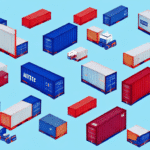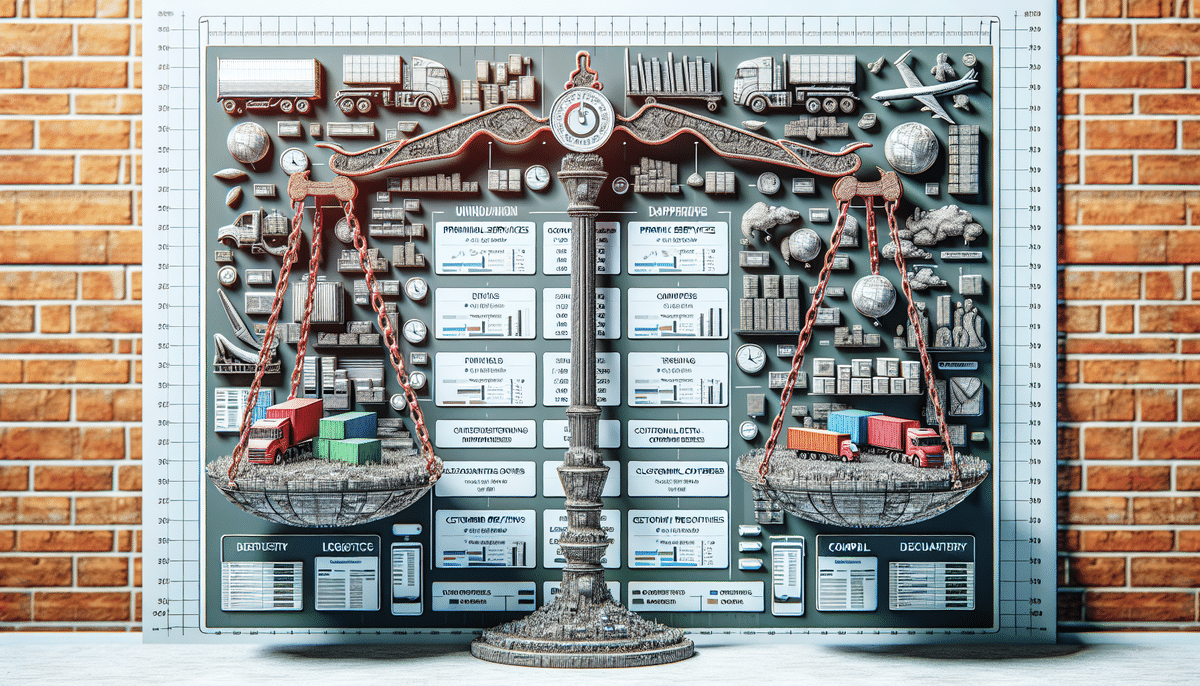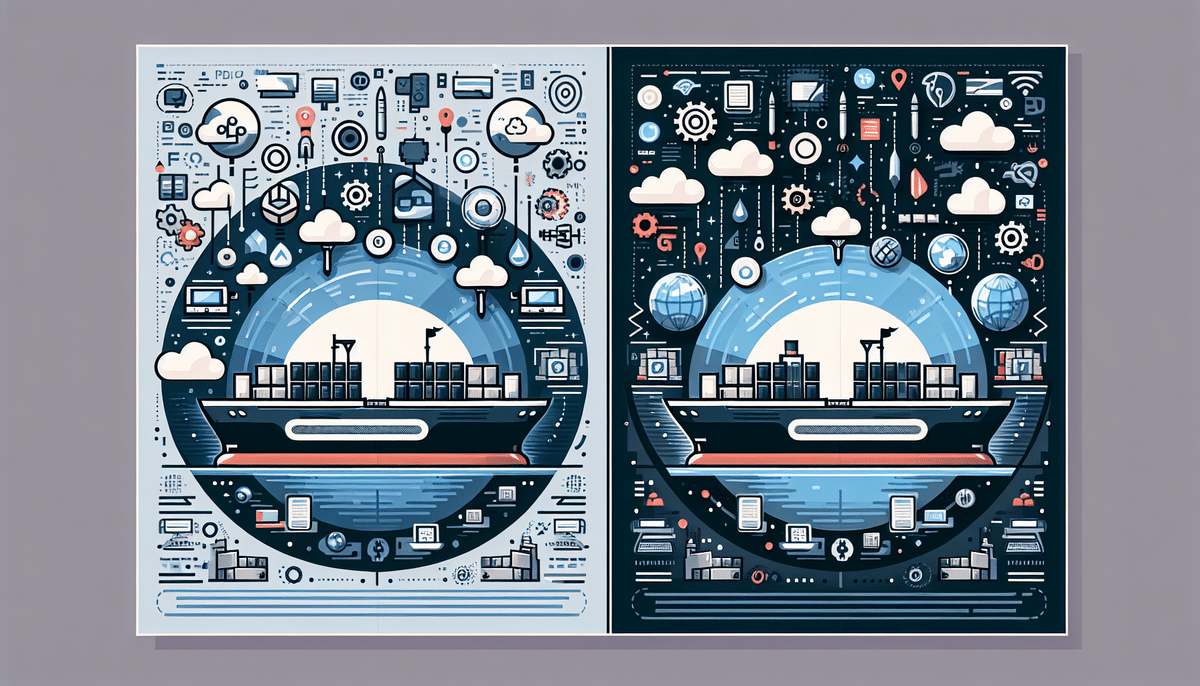DCL Logistics vs ShipBob: A Comprehensive Comparison for E-Commerce Businesses
If you're an e-commerce business owner searching for a reliable shipping and fulfillment partner, DCL Logistics and ShipBob are two of the most recognized names in the industry. Both companies offer a wide range of services to help businesses streamline their operations, but how do they compare? In this article, we'll take a comprehensive look at DCL Logistics vs ShipBob, examining their pricing models, features and benefits, customer reviews, case studies, and more.
Introduction to DCL Logistics and ShipBob
DCL Logistics is a California-based third-party logistics company that has been in operation since 1979. The company specializes in e-commerce fulfillment services, helping businesses manage their shipments from start to finish. DCL Logistics operates multiple warehouses across the U.S., providing clients with a wide range of fulfillment options.
ShipBob, on the other hand, is a tech-enabled logistics company founded in 2014. The company offers a full suite of e-commerce-focused fulfillment and shipping solutions to businesses of all sizes. ShipBob's platform allows businesses to easily manage orders, inventory, and shipments.
Both DCL Logistics and ShipBob have a strong focus on customer service and satisfaction. DCL Logistics prides itself on its ability to provide customized solutions to meet the unique needs of each client. ShipBob, on the other hand, offers a 2-day shipping guarantee and real-time tracking updates to ensure that customers receive their orders quickly and efficiently.
Additionally, both companies are committed to sustainability and reducing their environmental impact. DCL Logistics has implemented a number of eco-friendly practices in its warehouses, such as using energy-efficient lighting and recycling materials. ShipBob has also taken steps to reduce its carbon footprint, including using electric vehicles for last-mile deliveries and partnering with sustainable packaging companies.
Shipping and Fulfillment Services Offered by DCL Logistics and ShipBob
Both DCL Logistics and ShipBob offer comprehensive e-commerce fulfillment services, including pick-and-pack, kitting, and shipping. DCL Logistics offers warehousing services in multiple locations across the U.S., allowing businesses to store their inventory closer to their customers. DCL Logistics also provides value-added services like retail compliance, order management, and returns management.
ShipBob offers similar fulfillment services but also provides merchants with a software platform to manage their shipments. This platform integrates with popular e-commerce platforms like Shopify and WooCommerce, allowing merchants to automatically sync orders and inventory levels. ShipBob also offers same-day and two-day shipping for select locations, helping businesses meet the growing demand for fast shipping.
In addition to their standard fulfillment services, DCL Logistics also offers customized solutions for businesses with unique needs. This includes specialized packaging, labeling, and assembly services. DCL Logistics also has experience handling hazardous materials and temperature-sensitive products, making them a great option for businesses in the healthcare and pharmaceutical industries.
ShipBob has a network of fulfillment centers across the U.S. and Canada, allowing businesses to easily expand their reach and offer faster shipping to more customers. They also offer international shipping services, making it easy for businesses to sell and ship their products globally. ShipBob's software platform also includes analytics and reporting tools, giving merchants valuable insights into their shipping and fulfillment operations.
Comparison of DCL Logistics and ShipBob's Pricing Models
Pricing is a crucial factor when selecting a fulfillment partner. DCL Logistics and ShipBob offer different pricing models, so it's important to compare them to find the best fit for your business.
DCL Logistics operates on a volume-based pricing model, where the cost per unit decreases as the volume of units increases. DCL Logistics also charges additional fees for services like kitting, labeling, and retail compliance. This pricing model works well for businesses that have a high volume of orders but may not be the best fit for smaller businesses with lower order volumes.
ShipBob's pricing model is straightforward, with businesses paying a flat fee per order that includes pick-and-pack, shipping, and returns. ShipBob also offers discounted shipping rates through its partnerships with major carriers like USPS, FedEx, and DHL. This pricing model is ideal for businesses of all sizes, as it doesn't require a minimum order volume.
It's important to note that while DCL Logistics' pricing model may not be the best fit for smaller businesses, they do offer customized pricing plans for businesses with unique needs. This can be beneficial for businesses that require specialized services or have specific budget constraints.
On the other hand, ShipBob's flat fee per order may not be the most cost-effective option for businesses with high order volumes. In these cases, businesses may want to explore other fulfillment partners that offer volume-based pricing or negotiate a customized pricing plan with ShipBob.
Features and Benefits of Using DCL Logistics vs ShipBob
One of DCL Logistics' standout features is its experience and expertise in retail fulfillment compliance. The company helps businesses navigate complex retail compliance requirements and provides comprehensive compliance services. DCL Logistics also offers customized solutions for businesses with unique fulfillment needs, like temperature-controlled warehouse storage.
ShipBob's standout feature is its user-friendly software platform, which provides businesses with real-time inventory and shipping data. The platform allows businesses to automate their fulfillment process, saving them time and resources. ShipBob also offers free two-day shipping to customers who spend over a certain amount, helping businesses attract and retain customers.
Another advantage of using DCL Logistics is its extensive network of carrier partnerships. This allows businesses to choose from a variety of shipping options and carriers, ensuring that their products are delivered quickly and efficiently. DCL Logistics also offers international shipping services, making it a great choice for businesses looking to expand their reach globally.
Pros and Cons of Choosing DCL Logistics or ShipBob for Your Shipping Needs
One of the primary advantages of choosing DCL Logistics is its industry expertise, particularly in retail compliance. The company's multiple warehouse locations also provide businesses with more options for storing and shipping their inventory, which can help reduce shipping times and costs.
One of the pros of choosing ShipBob is its simple and straightforward pricing model. The company also offers a user-friendly platform that is easy to integrate with other e-commerce platforms. One downside, however, is that ShipBob's same-day and two-day shipping options are not available in all locations.
Another advantage of choosing DCL Logistics is its advanced technology and automation capabilities. The company uses state-of-the-art software and equipment to streamline the shipping process and provide real-time tracking and reporting. This can help businesses stay on top of their inventory and shipping operations, and make data-driven decisions to improve efficiency and reduce costs.
Customer Reviews and Testimonials: What People Are Saying About DCL Logistics vs ShipBob
Customer reviews and testimonials are essential when choosing a fulfillment partner. Both DCL Logistics and ShipBob have positive reviews from satisfied customers.
Customers praise DCL Logistics for its knowledgeable and responsive customer service team and their attention to detail in fulfilling orders. Clients also appreciate DCL Logistics' ability to accommodate their unique needs and requirements.
ShipBob customers appreciate the company's user-friendly platform and the speed and accuracy of its shipping services. Clients also value the company's commitment to transparency and the ability to track order status in real-time.
However, some customers have reported issues with DCL Logistics' inventory management system, citing delays and inaccuracies in tracking their products. On the other hand, ShipBob has received criticism for its limited international shipping options and higher pricing compared to other fulfillment providers.
Despite these minor drawbacks, both DCL Logistics and ShipBob continue to receive positive feedback from their clients and remain popular choices for businesses looking for reliable and efficient fulfillment services.
How to Choose the Right Fulfillment Partner for Your Business: A Comprehensive Guide
Choosing a fulfillment partner is a significant decision that can impact your business's success. To help you make an informed decision, we've compiled a guide on how to choose the right fulfillment partner for your business. Here are some factors to consider:
- Location and proximity to customers
- Experience and expertise in your industry
- Pricing and pricing models
- Technology and software integration
- Fulfillment flexibility and customization
- Customer service and communication
Another important factor to consider when choosing a fulfillment partner is their capacity and scalability. As your business grows, you'll need a partner who can handle increased order volume and inventory management. Make sure to ask about their current capacity and their ability to scale up as your business expands. Additionally, consider their warehouse facilities and equipment to ensure they can handle your products and any special requirements you may have.
Case Studies: Real-Life Examples of Businesses That Have Worked With DCL Logistics or ShipBob
Real-life case studies can provide valuable insights into how different businesses have successfully utilized DCL Logistics or ShipBob as their fulfillment partner. Here are a few examples:
One e-commerce business that worked with DCL Logistics was experiencing issues with inventory management and order accuracy. After partnering with DCL Logistics, the business saw significant improvements in both areas, reducing order errors by 99% and increasing inventory accuracy by 98%.
A clothing brand that partnered with ShipBob was able to scale its operations and improve shipping times with the help of ShipBob's platform. The brand's customers now receive their orders within three days, and the brand has seen a 300% increase in sales since working with ShipBob.
Another business that worked with DCL Logistics was a subscription box company that was struggling to keep up with demand and maintain consistent delivery times. DCL Logistics was able to streamline the company's fulfillment process, resulting in a 50% reduction in shipping times and a 25% increase in customer satisfaction ratings. The subscription box company was also able to expand its product offerings and increase its subscriber base by 40%.
The Future of E-Commerce Fulfillment: Trends and Predictions for the Industry
The e-commerce fulfillment industry is constantly evolving, and it's essential to stay up-to-date on the latest trends and predictions. Here are some trends to watch out for in the coming years:
- The continued growth of same-day and two-day shipping
- The rise of automation and robotics in fulfillment
- The increasing demand for sustainable and eco-friendly fulfillment practices
- The expansion of fulfillment services into new markets and regions
- The importance of data and analytics in optimizing fulfillment operations
Whether you choose DCL Logistics or ShipBob as your fulfillment partner, it's essential to evaluate your business's unique needs and requirements to find the best fit. With the right fulfillment partner, you can streamline your operations, improve customer satisfaction, and ultimately drive more sales and revenue for your business.
One trend that is expected to gain momentum in the e-commerce fulfillment industry is the use of augmented reality (AR) and virtual reality (VR) technologies. These technologies can enhance the customer experience by allowing them to visualize products in a more immersive way, which can lead to increased sales and reduced returns.
Another trend to watch out for is the increasing use of artificial intelligence (AI) in fulfillment operations. AI can help optimize inventory management, reduce shipping times, and improve overall efficiency. As AI technology continues to advance, it's likely that more and more e-commerce businesses will adopt it as a key component of their fulfillment strategy.




















